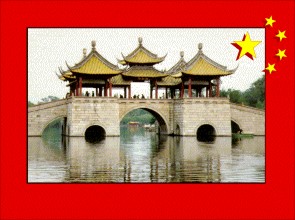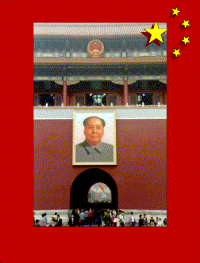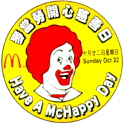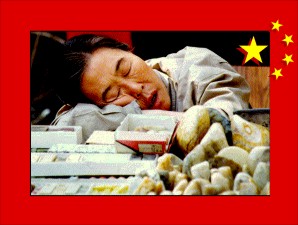

I had the opportunity to speak with a young Chinese woman in Zhenjiang only because she could speak English very well. She was studying art at a local college, but said she wasn't doing too well because she spent too much time studying English. Her teachers were all Chinese who had learned English in China. These teachers had explained to her that British English was "gentler" than American English, but gave the reason that American English was more widely used internationally for their preference to teach it instead of the Queen's English. She practiced her English by listening to the British Broadcasting Company (BBC) on the radio.
She asked me if I thought Taiwan and China were one country. She believed they were and said it would be a very bad thing if there was a war between the two because they each had relatives in the other place. I asked her about Tibet and she said "of course it's part of China." When I asked her if she was concerned about what might happen when Deng Xiaoping died, she said that she was concerned because she didn't want anything bad to happen. She didn't like Li Peng, but couldn't really say why other than "he hasn't done anything;" she thought Jiang Zemin was better than Li Peng, but thought there was someone better than him, Zhu Rongji, whom she believed would be the best leader for China. She thought that Zhou Enlai was the most admirable Chinese public figure in China's recent history and that Mao Zedong was a "great man" because he had risen from being a peasant to the leader of China even if he had made some "small" mistakes. I asked her if the Cultural Revolution was a "small mistake" to which she replied "no" and admitted that it was not a "small" mistake.

No matter what the guidebooks might say, there is nothing quite so memorable as riding a ferry across the Chang Jiang (Yangzi River) at dusk in a bus full of Chinese businessmen. Close your eyes and imagine the sensory experience: the air is thick outside, but not so thick as the air inside the bus where many of the businessmen are smoking; the smells are of fuel and the smoke being blown in your face; and the sound is of the ferry engine and talk between the businessmen interrupted intermittently by the sound of the men spitting on the ground between their knees. Alas everything wouldn't be so bad were it not for the thought of the ferry sinking in the muck of the river and the panic which would insue as you were burned by several cigarettes which probably wouldn't matter anyway since you're sitting in a temporary, fold-down seat in the center aisle and would probably be drowned by the others trying to escape through which ever window is furthest.
We saw lots of wheat fields on this bus ride as well as boats covered with wheat at the port of Zhenjiang on the Chang Jiang which were being unloaded.

The two most striking differences to me between the provinces of Jiangsu and Shandong were the change in crops we saw and the wider use of beasts of burden in Shandong. As we road the train north, it was common to see corn on the roofs of the farmers in Shandong and fields being plowed by a pair of two animals, often a donkey and a cow together. Wheat was more common in Jiangsu Province and corn could be seen alongside the train as it journeyed through Shandong either on rooftops or laid out as farmers tended to a harvest.
When in Tai'an and nearby Qufu both of which are in Shandong, we were reminded of a story that Marcel, a tourist from America, had told us about travelling in Yunnan. He had visited a particular Buddhist temple and the monk there told him that he had to come back later in the day to see something very special. Marcel did and he was treated to a statue of Buddha adorned with Christmas lights. Christmas-type lights are very popular in the parts of China we visited also probably because they are a cheap alternative to the attraction provided by neon lighting fixtures. We saw numerous stores especially in Tai'an and Qufu which used this effect commercially. This same phenomenon existed in Beijing, but less so and was conspicuously absent in the eastern part of the city where several large international hotels were there was enough neon lighting to remind one of Las Vegas.

Qufu is famous for being the birth place of Kong Fuzi (Confucius) as well as Mao Zedong's most notorious wife, Jiang Qing. The buildings associated with Confucius and his descendants are a tourist attraction for Chinese, but it does not hold the reverence that Confucianism itself, Buddhism or Shintoism do in the neighboring countries.
While sightseeing, we have relied somewhat blindly on our guidebook which stated that we could get a bus from Qufu back to Tai'an as late as 11:00 p.m. We went back to the bus station at 6:00 p.m. for the trip back to Tai'an and learned that there were no more busses. We walked around in panic and even tried to ask the taxis lined up across the street for help, but they were merely amused by our predicament. Then some elderly ladies came up to us and told us to take a taxi to a neighboring place from where we could take a long-distance bus. My comprehension of Chinese was so poor that it took me several minutes to understand what they were saying. When I tried to repeat to different group of taxi drivers what the women had said, they either didn't understand what I was saying or couldn't pass up the opportunity. We finally decided to pay Y200 for a taxi ride back to Tai'an, about a two hour long drive (our hotel room, a "dorm-room", consisted of three beds for Y50 each which we bought up for privacy since no double rooms where available at a cost of Y150).

On our train ride to Beijing, we met a Chinese man who was returning home after conducting research somewhere on the train line about an hour's journey before Tai'an. He was an geo-physicist who spoke much better English than I could speak Chinese so we communicated, not always effectively in English. I asked him about the China he knew and he seemed to give me fairly forthright answers within the context of a society where the people "aren't very much interested in politics" (or maybe more accurately people are sensitive to the repercussions of having any interest in politics which may be contrary to government policies). I asked him if China favored a relationship with Japan or the United States to the other. He said the government wanted to make friends with as many other countries as possible and did not seem to prefer one over the other, but then he spoke softer and his mood became more somber as he added that the people preferred the United States to Japan. When I asked him why he slowly came to the point that he had seen "some things in Yangzhou (Jiangsu Province)" when he was very young that the Japanese had done. He did not elaborate, but the fact that his mood changed drastically from the point of his mentioning this fact until the end of our journey (more than two hours later) was indicative of a profound period in his life. When I asked him about the Chinese people's relationship with religion, he told me that the older Chinese understood and practiced religion, but the young were oblivious to it. With the anti-intellectual sentiment that characterized the Maoist period of China in mind, I asked him if intellectuals were respected. He said that they were by the people's mouths, but not by their hearts. I also asked him about economic progress in China. He has travelled much in the eastern part of China and said that progress was very slow but perceptible. He added that the farmers near the city in particular had benefited within recent years.


Despite our frustrations in Beijing and China as a whole, we thought that the people we dealt with in Beijing were often the nicest people we had ever met anywhere. This precludes government business workers who were annoyed whenever they were interrupted from their daydreaming or newspaper reading. In spite of this friendly nature, China can appear to be a very rude place at times as well.

We went to a McDonald's restaurant that was very busy at 5:00 p.m. with at least ten registers open and people waiting to have their order taken. What was unique about this experience was that nobody was standing in line despite the size of the crowd. A couple of young, fit German men who sat down their trays of food and perspiration running down their faces intimating that they were as surprised as us to learn that ordering food could be so chaotic as to require a strategic battle plan. When you ordered food at this restaurant you literally had to wedge yourself strategically behind one of the persons ordering in front of you and fight to maintain your position with your weight and elbows. The cashiers take orders, randomly I guess, from the three or more people that can fit in the space between his or her register and the next register.
In general, we haven't had too much of a problem with people pushing us, but Chinese people love to cut into line and you often have to be nearly laying against the person in front of you so that someone won't move in front of you. While trying to purchase tickets at a train station in Tai'an where there was a long line of people who had been waiting for a ticket window to open for over a half hour, there were people who cut into line. The only rules of the game that I could perceive were that you needed to be able to physically do it without hurting someone, but outside of this restriction it is something that appeared to be expected and allowed. At the same train station, we were amazed when the train station staff of about five made the crowd stay in line from the gate which they opened until the passengers reached the door leading outside which was about thirty feet away. What was so amazing about this is that there is often a mad rush to the platform alongside the train. On another occasion, I was peering into one of the buildings at the Forbidden City which you aren't allowed into but can look into from one of the wide doorways. A woman, at least seventy pounds lighter than myself, tried to shove me aside so she could have a better look. I was so annoyed I shoved her away and yet she made no comment with her eyes or mouth as if the entire event was as natural as anything could be.
One night, we went out for dinner and sightseeing to a portion of one street on the West side of Beijing where our guidebook had mentioned there was a Uigur community which had transplanted itself from the Muslim province of Xinjiang in Northwestern China. We had seen some Arabic writing on the top of one door-frame when we were wondering through a hutong once, but this place was special. The people looked more European than they did Asian, they dressed differently than the Han Chinese we were used to seeing, there was Arabic music in the air, and signs were often in the roman alphabet, Arabic, and Chinese. Men and boys would try and talk us into coming into their restaurants, they would touch my hand or my arm, and one man even pulled me while another said "wo ai ni" (I love you) a couple of times as if this would get me to enter his restaurant. There were also more police men in this small area than any other similarly small space we had been in China, but we had no reason to feel threatened by the people. There weren't any touristy shops in the area, just restaurants which sold, amongst other culinary delights, a round, delicious unleavened sesame seed bread, and various forms of cooked lamb.

Around the edges of the inner part of the capital of China it is not uncommon to see horse-led wagons, but the most common vehicle for transporting goods in Beijing seems to be a three-wheeled bicycle with a bamboo wagon bed directly behind the driver. I don't think I have ever seen such a tool as widely utilized as these bikes in Beijing. They hauled people, food, charcoal, trash, just about any other product you could imagine, and where also widely used as portable food stalls or mini-eateries disguised by advertising boards of sorts placed on the front, back, and side when in a stationary position.

It seems that both ancient Greek and Chinese antiquities are better seen outside of these countries than at the historical sights or museums in the land of their creation, with one exception. The thriving antique shop business that exists in China breaks the rule. The Greek people, in contrast to Chinese, are either less dishonest, less enterprising or lesser artisans when it comes to making fakes because the amount of antique shops in China that at least claim to have dynastic antiquities tucked into small cubed spaces and in drawers of the ubiquitous cabinet in the back of their small shops is unfathomable. You enter one of these small shops that are crammed with symbols of China's once greatness and are shown items from the "Qing", "Ming", and even "Tang Dynasties" (it's interesting that the less famous dynastic periods in between the Ming and Tang Dynasties are never mentioned). All the evidence you need is a bit of dirt here or signs of wear and tear there before you hand over the large amounts of cash the antique seller expects for such dubiously valuable items.

